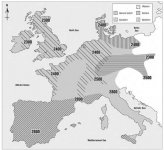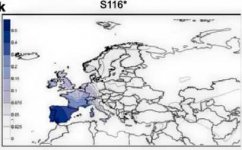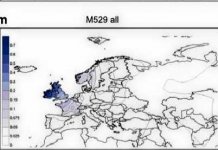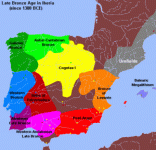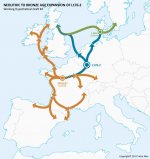You are too much obseded by the onomastics. SW France was settled by pre-indo-european peoples. You can call them as you want : Aquitanian, Basques, Iberians...It changes nothing. Maybe was there different groups among them, but it does not put off that these regions were pre-indo-european culture. According to the sources I have posted about toponymy in Galicia, actual Basques are probably linguistically the heirs of the ancient Aquitanians and the Iberians. Even if I don't deny that there should have been some geographical differences.
They are NOT one and the same. Aquitanian probably is the ancestor language of Basque, whereas Iberian is a distinct separate language, known from hundreds of inscriptions. The vast bulk of those are found in the area of Catalonia, but there's also inscriptions from western Andalusia and Murcia. The interesting part is that onomastic evidence for the Iberian language roughly matches the area where Iberian inscriptions have been found.
I might add - the relationship between Iberian and Basque/Aquitanian is disputed. There may have been borrowings of Basque/Aquitanian into Iberian, or vice versa, but the languages were
not necessarily part of the same family.
I might add that evidence for the Aquitanian language is almost exclusively onomastic, where I could refer to your own declarations on the usefulness of onomastics.
Honestly, I don't know, but several remarks :
- what you say is partially wrong : we have evidences of pre-indo-european languages in Northern Portugal and Spain (see the link I had given you).
- we have nowadays only inscrptions in regions that you are talking about, but who knows if one day some searchers will not find inscriptions in western Iberia.
- if the ancient Iberians of western Iberia had not a written culture, it does not mean that they were not Iberians. Do you expect to find Germanic runes in all regions settled by the Germanics ? I think they are not really numerous (if not absent) in some regions (Austria, Hessen, Switzerland...). Celtic peoples northern of the River Garonne had not a written culture (= few or no incriptions). Do you deny that Britain or Gauls were Celtic ?
We not only have inscriptions, we also have the accounts of geographers like
Strabo and Ptolemy which add to our onomastic knowledge, because they
recorded local town and tribal names. If you look at their entries about Gallaecia and Lusitania, you will clearly recognize distinctly Celtic/Indo-European local names. In fact, by the times of Strabo and Ptolemy, you have Celtic peoples not only in the northwest of Iberia, but also in the southwest. Both Strabo and Ptolemy explicitly talk of Celtic peoples in the post-Tartessian region in the Southwest, south of the Tagus and along the Guadiana.
What incentive would they have had to give a (in your opinion) "primarily non-Indo-European" area Celtic town names? That makes no sense.
Go into a library and check out the Geographies of Strabo and Ptolemy (or look for them online).
Read the entries on the Iberian penninsula.
- If the Celtic aristocracy dominated only Central and Western Iberia, it could explain that you find Iberians inscriptions only outside of their rule (don't forget that only the superior classes could read and write). I notice that the distribution of the Iberian inscriptions is closed geographically to the economical domination by the Phoenicians. I don't know if there is a link.
Interestingly, yes and no (other than it was more than just a "Celtic aristocracy"). Phoenician settlements were generally in the south of the Iberian penninsula, and in the northeast of the Iberian penninsula where the bulk of the Iberian inscriptions have been found, there were no Phoenician settlements (the Greeks settled there - Emporion and Rhodes - but only a centuries after the Phoenicians were already well-established in the south).
The writing systems of the Iberians are derived from the Tartessian writing system (though the northern variants also show Greek influence, whereas the southern variants are much closer to the Tartessian script), which is in turn derived from the Phoenician alphabet. Basically, writing spread from the Algarve and Western Andalusia to Eastern Andalusia and Murcia, and from there to Catalonia. As a final note, the Celtiberians of the upper Ebro/Douro river areas, adopted the northern Iberian writing system as it was used in Catalonia for writing their own language.
Why didn't the Lusitanians (or other people of the west/northwest) adopt the Tartessian writing system? Why did writing spread only in counter-clockwise direction on the penninsula? I don't know the answer, but this clearly is a real phenomenon for which there's no easy answer.
An so what ? My example was about the Germanics. There are hundreds, maybe thousands of Germanic toponyms in France, I didn't count. With your logic, regions as Auvergne, Savoy, Berry, Burgundy...should have been of Germanic language. No sense. Toponymy indicates presence. Unless it is very strongly dominant.
You may have noticed the word is "Auvergne", and not "Arverni". And it's "Bourgogne" not "Burgundi". Evidently one can realize that these words are rendered into
French.
It was a proof with the absurd. Anyway...
http://www.etymonline.com/index.php?term=Hungary
...with your logic, people could say that Hungary was from Hunnic background or culture do the ethymology.
How about no?
No, because what I say is sourced. If I was putting free assertions, I would agree, but it is not the case.
What I am saying is sourced as well.
You make your quick personal conclusion about a historical mystery. Searchers are not so affirmative as you. BTW, would the Lusitanian language be an indo-european language, it wouldn't mean that it was dominant among the population.
It's not a quick personal conclusion, it coincides - again - with onomastic evidence (note that inscriptions and onomastics are two different sets of data). There are a lot of Gallaecian town names which are clearly Indo-European but make sense as Lusitanian-derived because they conform with Lusitanian sound laws.
Also, the Lusitanians were one of the largest and most powerful tribes of western Iberia, and pitted Rome into a decades-long war against them. The Roman-Lusitanian War is a well established historic fact.
You turn round with the same arguments (and by there you recall me someone else...). How do you else explain the hundreds of Germanic place-names in Central France, even in Southern France, where no Germanic language has been spoken, excepted a minority ? Idem for the Scandinavian toponyms of Normandy ?
Obviously, Germanic peoples arrived in France, which is also established historically. Burgundians, Goths, Franks, Normans?
Look man, I really don't understand you. I mean, I dismiss the hypothesis of the Atlantic School
as well, because it makes no sense for the Celtic-speaking peoples to have originated in the Atlantic Façade, but that does not mean they do not have a point: there is plenty of evidence for the presence of Celtic-speaking peoples on the Iberian penninsula, and the "Classicist Hypothesis" (if you want to call it that - ie that Hallstatt/La-Tene are solely responsibel for the spread of the Celtic languages) simply cannot explain the presence of Celtic people on the Iberian penninsula. By that hypothesis, the Celts shouldn't be there. But they are there there's no denying of it, and they weren't just "a small Celtic elite ruling over a largely non-Indo-European population". These Celts
must have arrived there considerably earlier - otherwise you cannot explain how the Celtiberian language (which, as I would like to repeat, is the second-best attested Old Celtic language after Gaulish) is so archaic. This is something that is well-established by linguistics (unless you want to tell me that 130 years of linguist methodology are wrong).
You can't just go ahead and randomly proclaim that it wasn't like that, only because you (for some inexplicably reason) hate the people of the Iberian penninsula.


